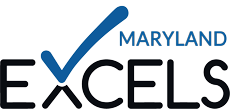Program Self-Assessments
Positive teacher-child interactions are a critical component of the quality of care provided in a program. By conducting self-assessments, a program has the opportunity to identify teacher strengths and areas for improvement. This process is used to create individual staff development plans and ongoing program improvement.
Maryland EXCELS has developed the following self-assessments and associated companion guides to help participants achieve quality rating 3 requirements.
Family Child Care Homes:
Child Care Centers:
Infant and Toddler
Preschool
School-Age
If you have questions or concerns about conducting your self-assessment at this time, please contact your Quality Assurance Specialist, for additional guidance.
Program Assessments Conducted by MSDE
The Classroom Assessment Scoring System (CLASS®) measures teacher-child classroom interactions. CLASS provides an objective, consistent, valid measure of teacher-child interactions, from supporting cognitive development to connecting with children individually.
The School-Age Care Environment Rating Scale, Updated Edition (SACERS-U™) is designed to assess group-care programs for children of school age, 5 to 12, during their out-of-school time. It identifies areas of strength and areas needing improvement in the following categories: Space and Furnishings; Health and Safety; Activities; Interactions; Program Structure; and Staff Development.
Programs that have achieved a draft rating 3 or quality rating 3 that request an assessment or programs that have achieved a quality rating 5 will have CLASS® and/or SACERS assessments, depending on the ages of children enrolled.
Visit the Maryland EXCELS and CLASS page on the Teachstone website to learn more and explore other resources.
Updated: May 2024




 GO BACK
GO BACK